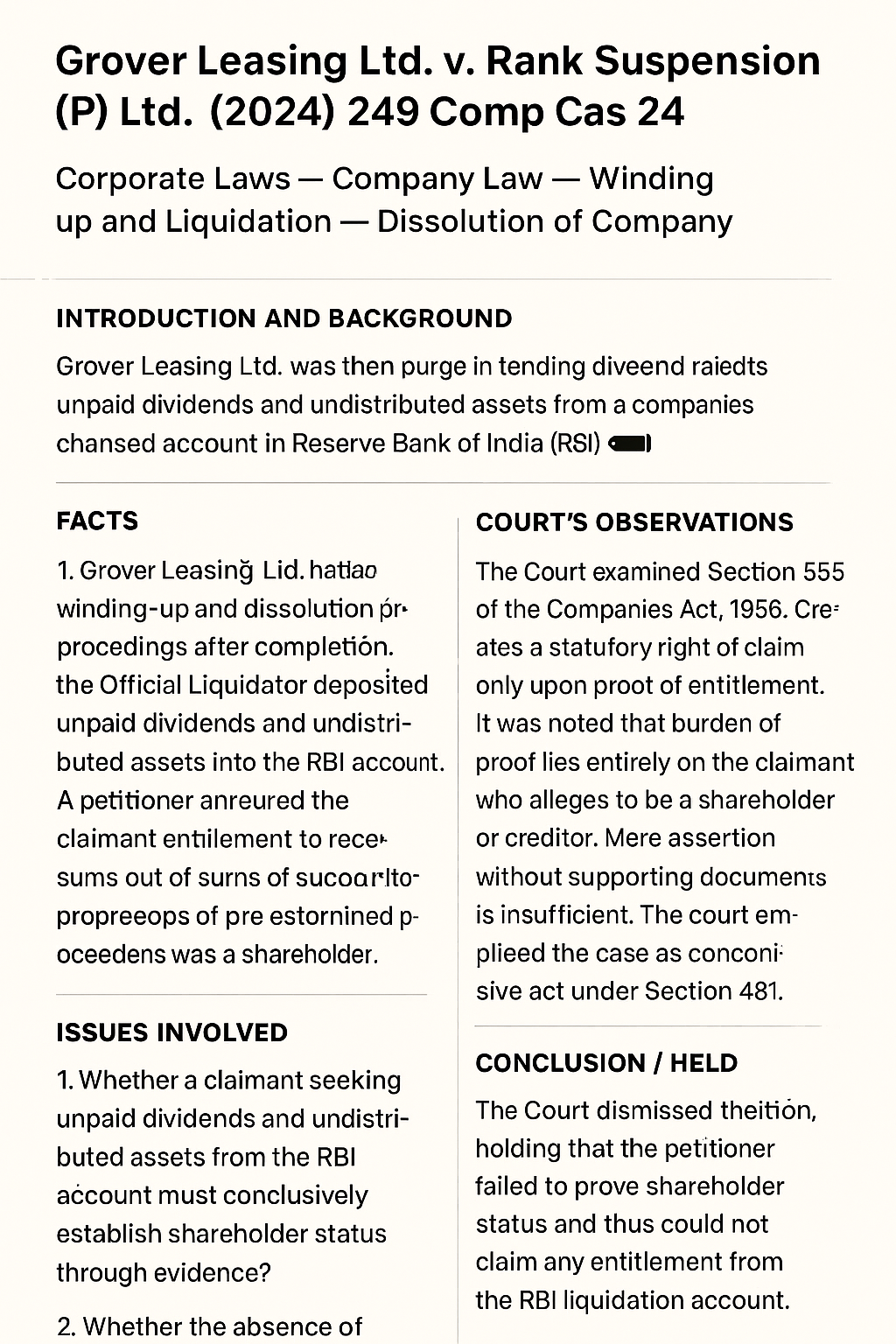View News
Grover Leasing Ltd. v. Rank Suspension (P) Ltd

Case Note: Grover Leasing Ltd. v. Rank Suspension (P) Ltd.
(2024) 249 Comp Cas 24
Introduction and Background
The case of Grover Leasing Ltd. v. Rank Suspension (P) Ltd. revolves around the claim of a purported shareholder seeking unpaid dividends and undistributed assets from a company already dissolved under the Companies Act, 1956.
When a company is dissolved upon completion of liquidation proceedings, all unclaimed dividends and undistributed assets are required to be transferred to the Companies Liquidation Account maintained by the Reserve Bank of India (RBI). Shareholders and creditors may subsequently claim their entitlements from such accounts, provided they can establish their right to receive the same.
This case addressed the evidentiary threshold for such claims and the legal rights of alleged shareholders once the dissolution has attained finality.
Relevant Legal Provisions
-
Companies Act, 1956 (corresponding provisions under the Companies Act, 2013 are noted in brackets):
-
Section 555: Payment of unclaimed dividends and undistributed assets into the Companies Liquidation Account in RBI.
-
Section 555(7): Right of any person entitled to claim payment of such dividends or assets, subject to proof of title.
-
Section 481: Dissolution of company upon winding up by the court.
-
(Under the Companies Act, 2013, Sections 352–358 provide for similar provisions regarding Companies Liquidation Account).
-
-
Indian Evidence Act, 1872: The burden of proof lies on the claimant to establish entitlement.
Facts of the Case
-
Grover Leasing Ltd., a company, had undergone winding-up and dissolution proceedings. Upon completion, the Official Liquidator deposited unpaid dividends and undistributed assets into the RBI account as required by law.
-
The petitioner approached the court claiming entitlement to receive certain sums from this account, alleging to be a shareholder of the dissolved company.
-
The Official Liquidator contested the claim, stating that there was no documentary evidence proving the petitioner’s status as a shareholder in the records of the company.
-
The matter came before the court for determination of whether such a claim could be sustained without sufficient proof of title.
Issues Involved
-
Whether a claimant seeking unpaid dividends and undistributed assets from the RBI account must conclusively establish shareholder status through evidence?
-
Whether the absence of the claimant’s name in the records of the company disentitles them from claiming rights in liquidation proceeds?
-
To what extent does the court exercise jurisdiction in reopening matters post-dissolution of a company?
Court’s Observations
-
The Court examined Section 555 of the Companies Act, 1956 and emphasised that the provision creates a statutory right of claim only upon proof of entitlement.
-
It noted that the onus of proof lies entirely on the claimant who alleges to be a shareholder or creditor. Mere assertion without supporting documents is insufficient.
-
The petitioner in this case failed to produce any share certificates, register of members entries, or other authentic documentary evidence establishing ownership of shares.
-
The Court clarified that dissolution of a company is a conclusive act under Section 481, and once assets are transferred to the RBI account, claims can only be entertained if substantiated with proper evidence.
-
The Court further stressed that allowing claims without proof would set a dangerous precedent, enabling fraudulent or speculative claims against liquidation accounts.
Conclusion / Held
-
The Court dismissed the petition, holding that the petitioner had failed to prove shareholder status and thus could not claim any entitlement from the RBI liquidation account.
-
It reaffirmed that statutory right under Section 555(7) is conditional upon proof of title.
-
Accordingly, the claim was rejected and the sums remained in the RBI account as part of undistributed assets of the dissolved company.
Key Takeaway
This judgment underscores the principle that:
-
Liquidation entitlements are not automatic; they must be backed by documentary proof of ownership.
-
The burden of proof lies heavily on the claimant.
-
Courts will not permit reopening of settled matters post-dissolution without strong evidence.
The case strengthens the jurisprudence that regulatory mechanisms like the RBI liquidation account cannot be diluted by unsubstantiated claims, thereby protecting the sanctity of the winding-up process.
"Unlock the Potential of Legal Expertise with LegalMantra.net - Your Trusted Legal Consultancy Partner”
Disclaimer: Every effort has been made to avoid errors or omissions in this material in spite of this, errors may creep in. Any mistake, error or discrepancy noted may be brought to our notice which shall be taken care of in the next edition In no event the author shall be liable for any direct indirect, special or incidental damage resulting from or arising out of or in connection with the use of this information Many sources have been considered including Newspapers, Journals, Bare Acts, Case Materials , Charted Secretary, Research Papers etc

